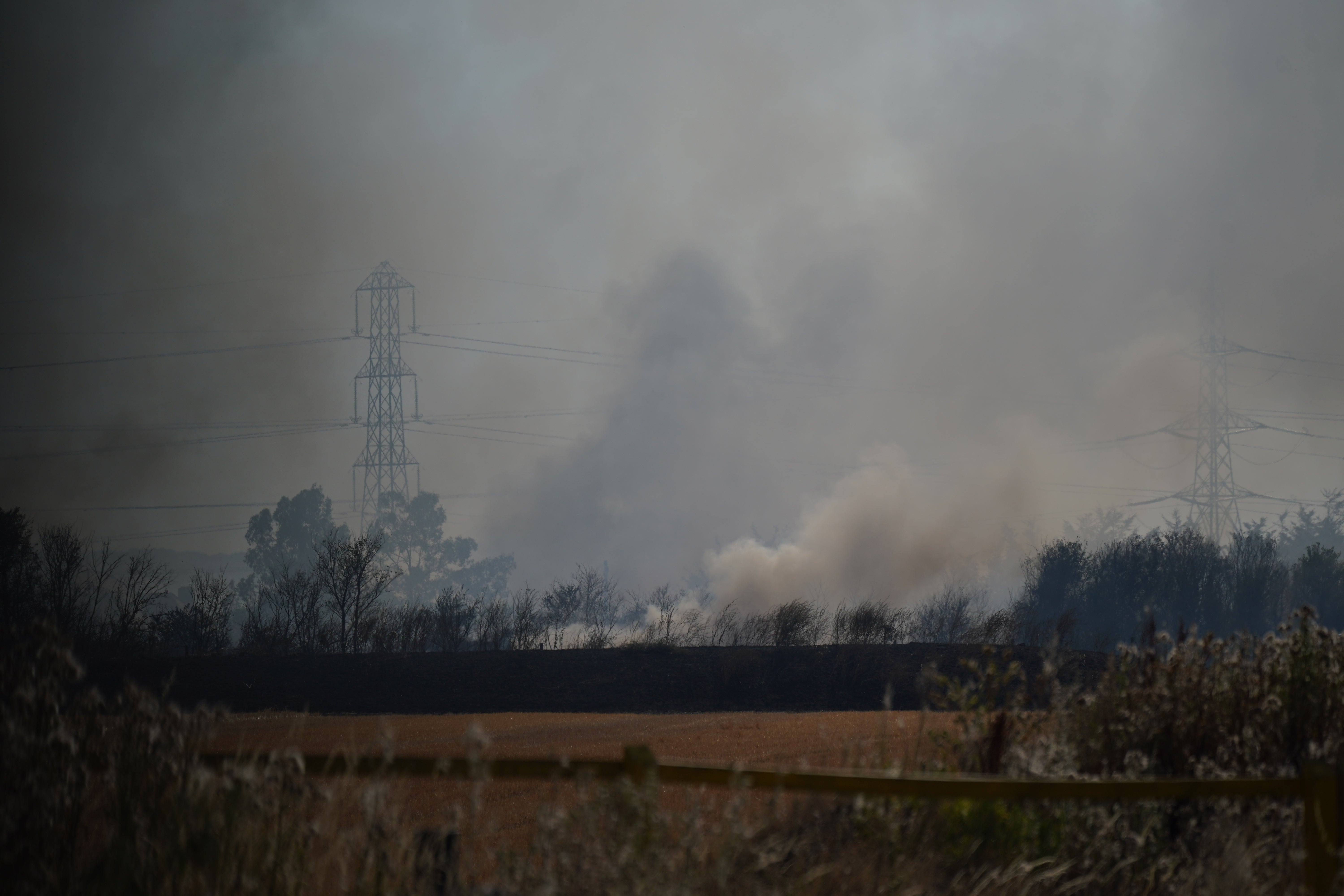UK temperatures soar above 40C for first time with transport chaos and fires
New record temperature of 40.3C were provisionally recorded as scientists warned it would be ‘virtually impossible’ without climate change.

Your support helps us to tell the story
From reproductive rights to climate change to Big Tech, The Independent is on the ground when the story is developing. Whether it's investigating the financials of Elon Musk's pro-Trump PAC or producing our latest documentary, 'The A Word', which shines a light on the American women fighting for reproductive rights, we know how important it is to parse out the facts from the messaging.
At such a critical moment in US history, we need reporters on the ground. Your donation allows us to keep sending journalists to speak to both sides of the story.
The Independent is trusted by Americans across the entire political spectrum. And unlike many other quality news outlets, we choose not to lock Americans out of our reporting and analysis with paywalls. We believe quality journalism should be available to everyone, paid for by those who can afford it.
Your support makes all the difference.Temperatures have topped 40C in the UK for the first time ever, as the sweltering heat fuelled hundreds of fires and widespread transport disruption.
A temperature of 40.3C was provisionally recorded in Coningsby, in Lincolnshire, on Tuesday afternoon, beating the previous record for the UK of 38.7C in Cambridge three years ago, by 1.6C.
The Met Office said at least 29 observation sites across England have provisionally broken the previous all-time record, from Bramham, in West Yorkshire, to Charlwood, in Surrey.
Scotland has experienced its hottest day on record, with the temperature reaching 34.8C in Charterhall in the Scottish Borders, Met Office provisional figures showed.
Amid the sweltering heat a major incident was declared in London in response to a surge in fires across the capital, nine people have died since Saturday in swimming accidents and there has been widespread disruption to train services.
As temperatures soared:
– Interim deputy chief executive of NHS Providers, Miriam Deakin, said the heatwave was forcing hospitals to scale back the number of planned surgeries and install cooling units and try to cool down IT server rooms.
– An East of England Ambulance Service spokesman said the service had seen above-average call numbers since Monday afternoon and it expected to still be seeing an impact from heat-related illness into the weekend.
– Road congestion in several cities, including Birmingham, London and Manchester was down on Tuesday, as people heeded advice not to travel, while commuter numbers were also down on the Tube and bus services in the capital.
– The record heat came after the UK endured its warmest night on record, with temperatures remaining in the mid-20s in some places.
– Sales of fans, ice cream and paddling pools and burgers rocketed as the heatwave sparked a spending spree on summer essentials, according to retailers, while tech experts urged smartphone users to keep their gadgets out of the sun to ensure they continue working properly.
Heatwaves are being made more intense, frequent and longer by climate change, and scientists said it would be “virtually impossible” for the UK to have experienced temperatures reaching 40C without human-driven global warming.
The Met Office’s chief scientist Professor Stephen Belcher warned temperatures would get more extreme in the future, and the only way to stabilise the climate was to cut greenhouse gas emissions to net zero.
The UK is experiencing record heat as much of Europe bakes in heatwaves that are fuelling wildfires in France, Spain and Portugal.
For parts of the UK, the searing temperatures come on top of months of below average rainfall, leaving conditions tinder-dry and putting most of England at “exceptional” risk of wildfires, with fire crews battling hundreds of blazes around the country.
On Monday, Essex County Fire and Rescue Service received three times its average number of calls, driven by wildfire reports, while a blaze at Lickey Hills Country Park near Birmingham, spread to around 50,000 square metres and forced 15 people to flee their homes.
Climate change is increasing fire danger across the UK, and we need to be prepared for it
London Fire Brigade (LFB) declared a major incident on Tuesday as it warned it was battling “several significant” incidents in the capital, with people urged not to have barbecues or bonfires due to the “unprecedented” challenge fire crews faced.
Around 100 firefighters tackled a blaze in the village of Wennington, east London, on Tuesday afternoon, with television footage showing black smoke billowing into the air, with buildings and fields on fire.
Nigel Arnell, Professor of Climate Change Science, University of Reading, said the hot, dry and windy conditions meant the smallest spark could set off a fire.
He warned: “Climate change is increasing fire danger across the UK, and we need to be prepared for it.”
Trackside fires and damage to overhead lines also halted train services, while there were widespread suspensions, disruptions, reduced services and temporary speed restrictions to cope with the risk of buckling rails.
Transport Secretary Grant Shapps conceded the UK’s transport network cannot cope with the extreme heat, saying that the Victorian-era infrastructure “just wasn’t built to withstand this type of temperature” and it would take decades.
Nine people have died or are feared dead in accidents in open water since Saturday, including several teenagers, and a swimmer who was missing at sea after an incident close to Clacton pier in Essex on Tuesday.
The Met Office said there would be a showery and thundery breakdown of the heat, with a yellow warning for thunderstorms parts of northern England and southern Scotland on Tuesday afternoon and evening and for parts of south east, east and central England on Wednesday afternoon and evening.